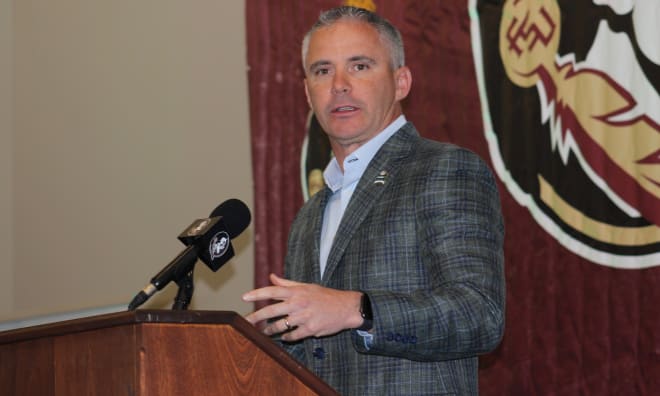Coaches seek national NIL law as part of effort to limit tampering

There are few topics in college athletics where you can find unanimity. There is an understanding that athletes should have the opportunity to transfer as well as earn revenue from their name, image and likeness.
There is also an understanding that tampering is a still-uncontrollable mess, inducing players to go in the portal with playing time or NIL. A year after Mike Norvell was outspoken at the ACC spring meetings about “people from the outside” having influence on Seminoles who weren’t in the portal, not much has changed.
“When you deal with third-party agents, tampering, all of that stuff is out there,” FSU’s coach said last week during the 2023 spring meetings for the league’s coaches, athletics directors and administrators. “I think everybody would recognize that is taking place. When you have those dynamics it’s hard to regulate. It brings a whole different perspective to what these student-athletes are going through. They are not always the best educated in some of the realities of whether it’s transferring a school and kids having to transfer credits. I think you see some of those things where it’s not always about the best information going to kids.”
If revenue generation is at the forefront of discussion among the ACC’s athletics directors, then the intersection of the transfer portal, NIL and tampering are among the most pressing for the league’s coaches. Solutions are also in short supply.
“Everybody’s howling,” ACC commissioner Jim Phillips said. “Not only our coaches. All of the coaches are howling. They just want some structure to this. NIL is not supposed to be a recruiting inducement.”
It’s not supposed to be an inducement but it clearly is, whether coaches like Norvell, Pittsburgh’s Pat Narduzzi and North Carolina’s Mack Brown are speaking on the record or others are talking in stories by national media outlets and venting anonymously. Tampering existed decades ago, long before the transfer portal’s creation in 2018 or NIL legislation in 2021. What can be done — if anything — to limit tampering?
Coaches and administrators are still seeking uniform national NIL legislation, which they hope would help level the playing field for coaches, athletes and football programs.
“I don’t live in knowing all state policies, but 30 different standards of how states operate within their standards of NIL,” Norvell said. “And now you see it’s being used, trying to create competitive advantages. It presents some unique challenges. Being able to have an umbrella approach federally, it helps give guidelines but also provides protection for the students.”
Phillips said he recently spent two days lobbying elected officials in Washington, D.C., on topics of importance to the ACC and the member schools. The discussion of a need for uniform federal legislation existed long before states enacted NIL laws on July 1, 2021. A few NIL bills have been debated and drawn up in Washington, including one in the works.
“We need some help in getting some standardization of what NIL is,” Phillips said. “I think it’s fantastic. Student-athletes should absolutely be able to monetize the name, image and likeness. At the end of the day, if you're going to have intra and interstate competition, there has to be some level playing fields on that.
“As it relates to name, image and likeness, there has to be agent registration, there has to be a standardized contract, there has to be a registry. And then fourth there has to be education on campus.”
When asked in his press conference about the infamous slow pace in Congress and when a law could be coming, Phillips acknowledged college athletics will continue to play the waiting game for help on NIL from Washington.
“For a little period of time,” Phillips said. “I think we're all just exasperated with how do you fix it in the interim.”
More takeaways from Phillips' conversation with media
Phillips also appeared to hear consensus from the ACC’s coaches on the need for “a national governance structure for football.” While not mentioning the NCAA by name, Phillips said: “We have to continue to refine and modernize FBS football, Power 5 football and the ability to get things done in the governance structure.”
The ACC has eliminated divisions for 2023, similar to the structure of the COVID season in 2020. This should allow two football programs to be elevated not just to the ACC’s championship game but potentially to an 12-team playoff in 2024.
“I'm really incredibly excited about the collapsing of the divisions and us having a chance to get our very two best teams into the ACC championship and then into the college football playoff,” Phillips said. “And then as we have an expanded College Football Playoff, it really does give us a chance to have multiple teams by doing that.”
FSU hasn’t traveled to Virginia Tech since 2012 or played at Pittsburgh since 2013, although the Seminoles visit in November. The opponents will now rotate with frequency as the Atlantic and Coastal divisions have been eliminated, creating three permanent partners.
“I'm fired up for our student athletes that over the course of a four-year span that they're going to travel and play every school in our conference home and away,” Phillips said. “We've just gone too long with certain games not being played six years, eight years. And so I think that those things are certainly benefits.” FSU fans have also been appreciative of the opportunity to see the schedule open up with more variety of league opponents home and away.
Follow The Osceola on Facebook
Follow The Osceola on Twitter
Subscribe to the Osceola's YouTube channel
Subscribe to the Osceola's podcasts on Apple
Subscribe to the Osceola's podcasts on Spotify
